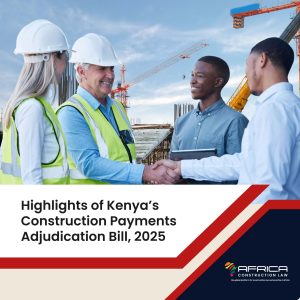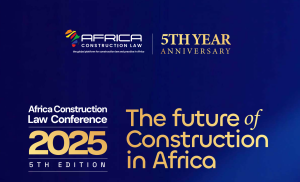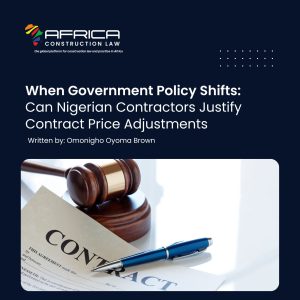The Importance of the Employer’s Consent for Subcontract Works in Nigeria
by Osinachi Nwandem,* senior associate, ǼLEX, Nigeria
In Nigeria, although like most parts of the world, contractors are permitted to subcontract certain construction works. However, the contractor will be required to get prior written approval from the employer. The prior approval is important to allow the contractor to receive payment for work carried out by the subcontractor.
The requirement for prior written approval for subcontracted works is sanctioned under the various standard forms of contracts used in Nigeria, such as the General Conditions of Contract for the Procurement of Works, 2011 (the GCC); the Standard Form of Building Contract in Nigeria, 1990 (SFBCN); the JCT Standard Form of Contract (with Quantities), 2005 edition (the JCT 05 SBC/Q); the Federal Ministry of Works Standard Conditions of Contract (Roadworks), 1999 edition (FMOWC); and the FIDIC Conditions of Contract for Building and Engineering Works Designed by the Employer, 1999 edition (the “1999 FIDIC Red Book”).
The consequence of failing to obtain the employer’s consent before subcontracting the works
Where the contractor subcontracts work without the prior consent of the employer, such subcontracted work is unauthorized, and the contractor will be in breach of the contract.
The arbitral tribunal will support the employer’s decision not to pay any invoice or payment application regarding the unauthorized subcontracted work. The arbitral tribunal’s decision is backed by the long established Nigeria principle of law enunciated in the case of Dragetanos Constr. (Nig.) Ltd v. F. M. V. Ltd., that once contractual agreements are shown to have been freely entered into by the parties, the terms must be fully observed and enforced.
The contractor can receive payment despite the breach
Even though the contractor has breached the contract on subcontracted works, in certain exceptional cases the contractor may be entitled to be paid for unauthorized subcontracted works.
Interestingly, court decisions and the standard forms of construction contracts used in Nigeria offer instances where the contractor may receive payment for unauthorized subcontracted work. This article examines three instances:
(a) The contractor will receive payment if the employer had previously approved the contractor’s payment application for unauthorized subcontracted work
Where the employer had in the past paid the contractor for unauthorized subcontracted work, the arbitral tribunal will conclude that the employer has waived the strict contractual requirement of a written approval for the subcontracted work.
The principle of waiver is firmly established in Nigeria. In Total (Nig.) Plc v. Ajayi, the Court of Appeal confirmed that:
“Once a party waives his right in respect of an aspect of performance of a contract in accordance with the terms agreed by the parties to the contract, the act prevents the party who had waived his said right under the contract from insisting upon his legal right, having regard to the dealings which had taken place between the parties.”
Given the above, the arbitral tribunal will not allow the employer to refuse subsequent payments for unauthorized subcontracted work as the employer has by paying for previous unauthorized subcontract works abandoned compliance with the contractual requirement.
Watch out for the non-waiver clause
The contractor’s assertion that the employer waived the contractual requirement may not be successful, where the contract includes a non-waiver clause.
Parties’ contractual obligations and rights may be difficult to observe and to note. And, so for fear of being caught up by the previous failure to seek remedy for contractual breaches, employers try to include a clause to protect and preserve their rights and remedies subsequently. This clause is referred to as a non-waiver clause.
The GCC 2011, one of the standard forms of construction contract used in Nigeria, provides for a non-waiver. Specifically, Clause 4.3(a) of the GCC 2011 states that:
“No relaxation, forbearance, delay, or indulgence by either party in enforcing any of the terms and conditions of the terms of the contract or the granting of time by either party to the other shall prejudice, affect or restrict the rights of that party under the contract, neither shall any waiver by either party of any breach of contract operate as a waiver of any subsequent or continuing breach of Contract.”
Where a contract includes a non-waiver clause, as in the GCC 2011, the arbitral tribunal will likely reject the contractor’s claims that the employer had previously paid it for unauthorized subcontracted works. Rather, the arbitral tribunal will accept the employer’s refusal to pay notwithstanding that the employer had paid for unauthorized subcontracted works in the past.
The basis for the arbitral tribunal’s endorsement of the employer’s decision not to pay is backed by the decision in Dragetanos’ case that the parties are bound by the entire contract which they freely entered into. Given this, the arbitral tribunal is under a duty interpret the contract as it is and enforce the non-waiver clause.
(b) The contractor will be entitled to payment if the contractor’s agent and not a subcontractor performed the work
Even though the contract prohibits unauthorized subcontracted work, the contractor will not be in breach where it performed the work through an agent.
The Nigerian law recognizes the principle of agency. Under the agency principle, a person who does through another does by himself. This means that the acts of the contractor’s agent are, for all legal purposes, the acts of the contractor.
It is important to clarify that the contractor’s agent is not a subcontractor, but the contractor’s representative, deputy or steward. Subject to the contract, the contractor’s payment claim will be successful once it satisfies that its agent performed the work.
Watch out for the clause requiring approval of the contractor’s agent.
The SFBCN and the FMOWC do not provide for the contractor’s agent. As a result, the contractor under these forms of contract can demand payment for the work done through its agent.
Yet, this exception may not be available to the contractor where the contract is the 1999 FIDIC Red Book. This is because Clause 4.3 of the 1999 FIDIC Red Book requires that the contractor submits the name and details of its agent(s) to the engineer for approval.
Under Clause 4.3, it is only the approved agent that can act on the contractor’s behalf.
So, where a person or entity not recognized by the engineer carried out the work, the contractor will not receive payment for the work done. The tribunal will enforce the 1999 FIDIC Red Book by upholding the employer’s refusal to pay the contractor for work performed by an ‘unapproved agent’.
(c) The contractor will be entitled to payment if the employer unreasonably withheld consent
Although the GCC, SFBCN and FMOWC require the employer’s written consent before subcontracting works, these contracts require that consent must not be unreasonably withheld. Where a contract contains such a provision, the contractor will still receive payment for the unauthorized subcontracted work. However, the contractor will need to establish that the employer unreasonably withheld consent to contractor’s request to engage the subcontractor.
While there are no Nigerian decisions to guide on when consent is deemed to be unreasonably withheld, we can draw guidance from foreign decisions of common law countries. In the English case of Porton Capital v. 3M UK Holdings, the court guided that for consent to be deemed unreasonable, the decision to refuse consent must be so unreasonable that no reasonable person acting reasonably could have made it.
Accordingly, the employer will be guilty of unreasonably withholding consent where the refusal is extraneous or disassociated from the main issue of the contract.
Where the employer merely refuses to give consent without explaining or justifying reasons for its refusal, this lack of explanation will show ‘unreasonableness’.
Given the above guidance by the English and Australian courts, the contractor will need to satisfy to the arbitral tribunal that:
- It had written to the employer’s representative explicitly requesting the employer’s approval to subcontract the work.
- The employer’s representative did not respond to the contractor’s request for consent; or
- The employer’s representative did communicate its refusal to consent but failed to state any reason for its refusal, or
- Although the employer’s representative communicated reasons for its refusal, the reasons provided by the employer’s representative were unconnected with the contract.
A word of caution for Employers
Employers can minimize the success of the above exceptions by taking note of the following points:
(a) Existing contracts:
- Employers must be well-informed of the rights and obligations of every party under the contract. This will prevent the contractors from suggesting that the employers failed to respond to the contractors’ request for consent to engage a subcontractor or that the employers waived their rights to insist on compliance with the contractors’ contractual obligations.
(b) Future contracts:
- While it is ideal for employers to note the rights and obligations of parties under the contract, it may be necessary for parties negotiating construction contracts to include a non-waiver clause as exemplified by the GCC 2011. This will shield the employers’ previous failures to insist on a written consent before subcontracting.
- Employers negotiating future contracts can include provisions regulating the contractors’ representatives as excellently done by the 1999 FIDIC Red Book.


















